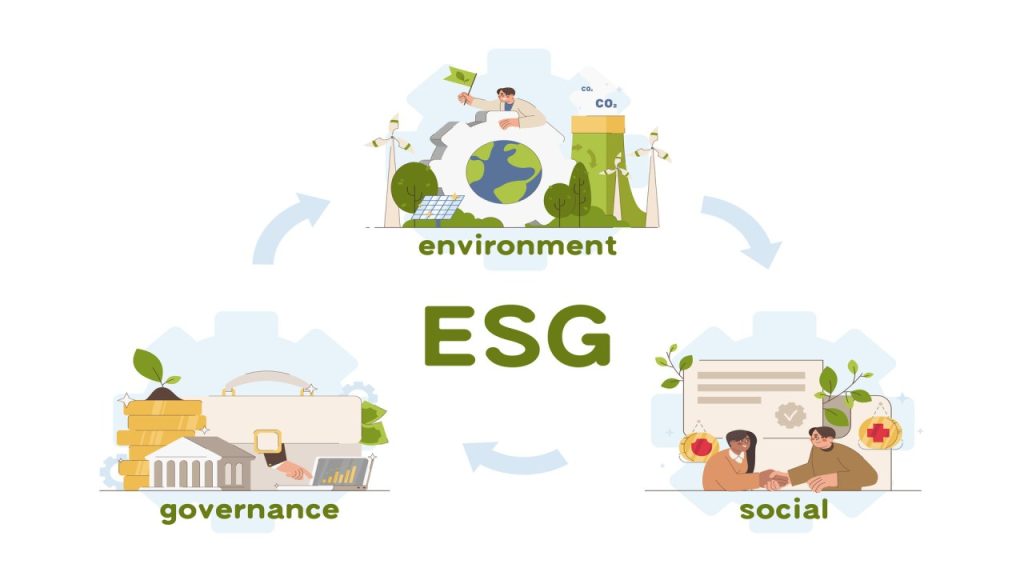Introduction: The Rise of ESG Investing
In recent years, the global financial landscape has witnessed an increasing shift toward socially responsible investing, with Environmental, Social, and Governance (ESG) factors becoming a critical focus for investors. ESG investing, which incorporates these non-financial factors into investment decisions, is not just a passing trend but an integral part of the evolving market. Investors are increasingly aligning their portfolios with ESG criteria as they recognize that sustainability, ethical practices, and governance standards can directly influence financial performance.
The principles of ESG investing, which address environmental concerns, social responsibility, and governance practices, have become more relevant than ever. Investors are now looking to ensure that their capital supports companies that demonstrate long-term sustainability, ethical behavior, and positive societal impact. This article will explore the principles behind ESG investing, its growing importance in today’s market, and the recent developments influencing investor interest and stock performance in the ESG space.
Understanding ESG Investing Principles
ESG investing is rooted in the idea that a company’s long-term performance is not solely determined by financial metrics, but also by how it impacts the environment, society, and how it is governed. By considering these factors, investors aim to identify companies that are well-positioned for sustainable growth while also contributing positively to society. Let’s break down the three pillars of ESG investing:
- Environmental (E)
The environmental aspect of ESG refers to how a company’s operations impact the natural world. Investors assess factors such as carbon emissions, resource use, waste management, and efforts to reduce environmental footprints. Companies that adopt sustainable practices, like using renewable energy, reducing pollution, and promoting efficient resource use, are often viewed more favorably. This element is particularly important as global climate change continues to be a key concern for governments, consumers, and investors alike.
- Social (S)
The social component of ESG focuses on a company’s relationships with employees, customers, suppliers, and the communities in which it operates. This includes considerations such as labor practices, diversity and inclusion, human rights, and community engagement. Companies that prioritize fair wages, foster an inclusive work environment, and contribute positively to their communities are seen as more socially responsible. Social responsibility also extends to how companies handle issues like customer privacy, product safety, and supply chain ethics.
- Governance (G)
Governance refers to how a company is run, including its leadership, transparency, accountability, and ethical decision-making. Key factors include the composition of the board of directors, executive compensation practices, shareholder rights, and corporate integrity. Companies with strong governance structures are less likely to be involved in scandals or legal issues, and they are more likely to create sustainable value for shareholders and stakeholders. Investors place high value on companies that demonstrate ethical leadership and are committed to transparency and good corporate citizenship.
The Growing Importance of ESG Investing
In the past, financial metrics alone guided most investment decisions, with environmental and social considerations relegated to the background. However, over the last decade, this paradigm has shifted significantly. Investors are increasingly recognizing the financial materiality of ESG factors and their potential to impact risk and return. Below are some reasons why ESG investing has grown in importance:
- Growing Demand for Sustainable Investment Products
The demand for ESG-focused investment products, including mutual funds, exchange-traded funds (ETFs), and bonds, has surged. Institutional investors, such as pension funds, endowments, and sovereign wealth funds, have been at the forefront of this shift. Many of these investors now require companies to meet specific ESG criteria before they can be included in their portfolios. Additionally, individual investors are increasingly looking to align their investments with their personal values, driving the demand for sustainable investment options.
- Performance Potential of ESG Investments
There is growing evidence that companies with strong ESG practices tend to outperform their counterparts in the long run. Research has shown that companies with robust environmental, social, and governance practices often have lower operational risks, better employee morale, and stronger brand loyalty—all factors that contribute to their overall performance. As a result, ESG investing is no longer viewed as a purely ethical decision but one that also makes sense from a financial standpoint.

- Corporate Responsibility and Public Perception
As awareness of environmental and social issues grows, there is increasing pressure on companies to take responsibility for their impact on the world. In response, many corporations are improving their ESG practices to maintain their reputation and appeal to socially-conscious consumers. Consumers today are more likely to support brands that align with their values, and as a result, companies that prioritize ESG factors can benefit from enhanced brand loyalty, customer retention, and increased sales.
- Regulatory and Policy Support
Governments and regulatory bodies are increasingly introducing policies that encourage or require companies to disclose their ESG performance. The European Union, for example, has introduced the Sustainable Finance Disclosure Regulation (SFDR), which mandates financial institutions to disclose how their investments align with ESG criteria. This regulatory shift is driving further adoption of ESG investing, as companies and investors alike seek to comply with evolving sustainability standards.
Recent News Influencing ESG Stock Performance and Investor Interest
The rise of ESG investing has not occurred in a vacuum. Recent news and events have brought ESG factors to the forefront of the financial world, significantly influencing stock performance and investor sentiment. Let’s examine some key developments that have shaped the ESG investing landscape:
- Climate Change and the Global Energy Transition
The growing urgency of addressing climate change has had a profound impact on ESG investing. In particular, the energy sector has undergone a major transformation, with investors increasingly seeking to divest from fossil fuels and allocate capital toward renewable energy companies. The U.S. rejoining the Paris Agreement, coupled with a global push toward net-zero emissions targets, has accelerated investments in clean energy and sustainability-focused companies. Stocks in companies that are leading the way in renewable energy, electric vehicles, and energy efficiency technologies have seen significant growth.
For example, companies like Tesla, NextEra Energy, and Enphase Energy have benefited from the shift toward renewable energy. Tesla’s rise as a leader in the electric vehicle industry reflects how consumer preferences and government policies are driving demand for ESG-compliant companies. Similarly, NextEra Energy, one of the largest producers of wind and solar energy, has seen its stock perform well as investors focus on companies that are making meaningful contributions to the global energy transition.
- Social Justice Movements and Corporate Accountability
Social issues, such as racial equality, diversity, and human rights, have garnered increased attention in recent years, especially following movements like Black Lives Matter and Me Too. In response to these movements, investors have placed more emphasis on companies that prioritize diversity and inclusion, fair labor practices, and human rights. Companies that fail to address these issues adequately risk reputational damage and reduced investor confidence.
For example, the retail industry has seen increased pressure to improve labor practices and ensure fair wages for workers. Companies like Patagonia, which has long been committed to social responsibility and sustainability, have seen increased investor interest due to their alignment with social justice movements. On the other hand, companies that have faced criticism for poor labor practices or a lack of diversity have seen their stock prices suffer.
- Regulation and Reporting Standards
Governments and regulators are also playing a key role in shaping ESG investing. In the United States, the Securities and Exchange Commission (SEC) has begun to take a more active role in overseeing ESG disclosures, with a particular focus on climate risk. Similarly, the European Union has introduced the SFDR, which requires financial institutions to disclose how their investment products align with ESG factors. These regulations are pushing companies to be more transparent about their ESG practices, which, in turn, influences investor decisions.
- The Impact of COVID-19 on ESG Investing
The COVID-19 pandemic has underscored the importance of resilience and responsible governance, further accelerating the adoption of ESG principles. The pandemic has highlighted the need for companies to prioritize employee welfare, community health, and ethical governance. Investors have increasingly looked for companies that can navigate crises while adhering to strong ESG principles. As a result, stocks of companies with robust ESG frameworks have generally performed better during periods of uncertainty, as they are seen as more capable of managing risks and adapting to change.
Conclusion: The Future of ESG Investing
ESG investing is no longer a niche market but a mainstream strategy embraced by investors of all kinds. As social and environmental issues continue to gain prominence, the importance of ESG principles in investment decision-making will only increase. The rise of sustainability-focused investments and the growing demand for companies with strong environmental, social, and governance practices are transforming the way investors approach their portfolios.
With regulatory changes, evolving consumer preferences, and global efforts to tackle climate change, ESG investing is expected to continue to grow in importance. Investors who align their portfolios with ESG principles stand to benefit not only from financial returns but also from the satisfaction of knowing that their investments are contributing to a better, more sustainable world.












































